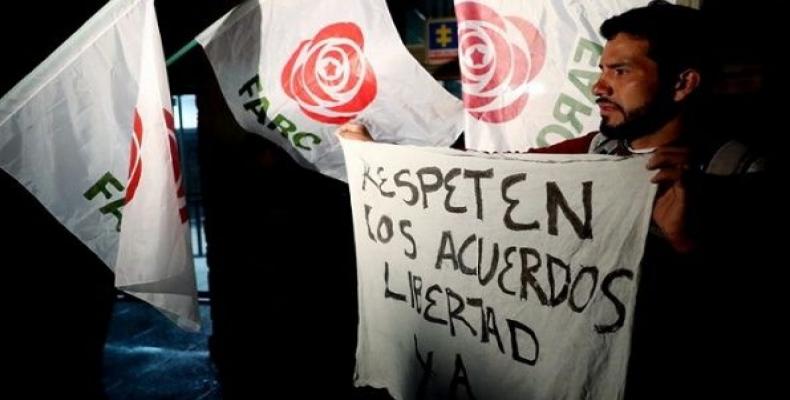Editado por Pavel Jacomino
2018-04-17 16:00:53
Facebook
Pinterest
Telegram
Linkedin
WhatsApp

Havana, April 17 (RHC)-- The Cuban and Norwegian governments, which sponsored the talks and the subsequent peace agreement between the Colombian government and the former insurgent group FARC, expressed their concerns about the current state of the implementation of the peace process in the country amid the persecution and killing of members of the former guerrilla group as well as the recent arrest of congressional representative Jesus Santrich.
“We are worried about the recent events related to the peace process,” said a statement signed by both governments, which also called on Colombian authorities to “guarantee the protection of the final agreement... and secure the strict observance of the deal, including the provisions related to the Special Jurisdiction for Peace.”
The Alternative Revolutionary Forces of the Common, the new political organization of the FARC, pulled out of the presidential campaign as their leader Rodrigo Londoño “Timochenko” suffered from health issues and the party decided the government wasn't providing FARC members with the ideal security conditions.
The situation escalated when Jesus Santrich, a former FARC commander, was arrested on drug trafficking charges by DEA's order, who accused him of taking part in a business network intending to export 10 tons of cocaine into the United States, and may now face extradition. "With the capture of our comrade Jesus Santrich, the peace process is at its most critical point and is threatened to be a true failure," said Ivan Marquez, future representative and number two of the FARC, said at a press conference in Bogota last week. He also demanded Colombian President Juan Manuel Santos "keep his word" regarding the peace process.
Interpol's red alert accuse Santrich of participating in the drug trafficking network between June 2017 and April 2018. His defense filed an Habeas Corpus appeal but it was rejected by Bogota's Superior Tribunal. Also, the activities of groups claiming to be FARC dissidents who oppose the peace agreement and have refused to demobilize, are being used to discredit the peace agreement despite FARC leadership distancing itself from them and rejecting their actions.
One of those groups, the Oliver Sinisterra Front led by Guacho, recently kidnapped and murdered three Ecuadorean journalists reporting on the violence situation on the border between both countries. Added to that, some in the Colombian government claim that the former insurgent group wasn't honest about their assets and accused it of running a money laundering chain of stores, which sparked riots and looting in several cities of Colombia. The FARC leadership flatly reject such accusations and said they have made all their assets available and have welcomed any government audits.
According to the communique by Cuba and Norway, the peace process is “living difficult moments,” and reminded that “is important that the involved parties and the international community reaffirm their support to the process and the enforcing and observance of the agreement.”
They also recommended speeding up the actions aimed at guaranteeing the full reintegration and reincorporation of FARC's former fighters into civil society and reiterated their compromise to reach a stable and lasting peace in Colombia.
Gloria Ospina, director of the Colombia in Peace Fund, was dismissed from office on April 9 after being accused of irregularities in managing the economic resources provided by the international community for the peace process.
The peace process has been heavily politicized and is one of the main discussion points for all candidates in the May 27th presidential elections. Most of them support the continuance of the process, including leftist Gustavo Petro, but the right-wing protegee of Alvaro Uribe, Ivan Duque, has said the agreement needs serious restructuring.


